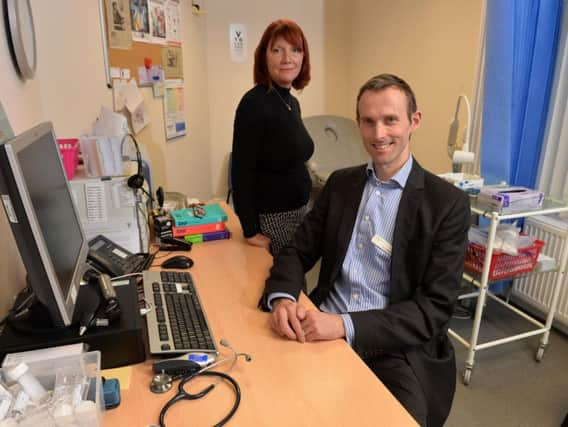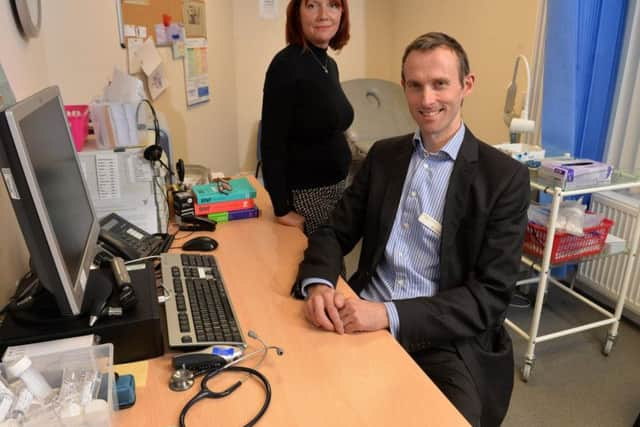This pilot scheme could see a paramedic called out instead of a GP to your home in Leeds


But the role that paramedics play in the community is now being explored and expanded as part of groundbreaking new pilot that aims to support the city’s over-stretched GP surgeries as pressures during winter intensify.
Today, for the second day in a series of special reports looking at winter health pressures in Leeds, the Yorkshire Evening Post can exclusively reveal how the project is working to help cut hospital admissions, improve response times and help GPs by sending specially-trained paramedics out into the community.
Advertisement
Hide AdAdvertisement
Hide Ad

How the trial works
The Rotating Paramedic trial, as it is called, run by Health Education England in partnership with NHS England and Yorkshire Ambulance Service (YAS), was first launched in June
In West Leeds, where 15 practices are taking part in the pilot, it has seen paramedics with extra training, carrying out clinics at surgeries and attending home call-outs in the community, to reduce pressures on the on-call GPs.
Advertisement
Hide AdAdvertisement
Hide Ad“It’s to plug a shortage in GPs,” said Dr John Keene, GP at the West Leeds Family Practice in Farsley which has been heavily involved in the trial scheme.
“You will be more used to seeing paramedics arriving in an ambulances and green uniforms.
“But these specialist paramedics are driving unmarked cars and are in plain clothes.
“It’s for patients who previously required a GP visit to assess their condition – deciding whether they need to be treated at home or admitted to hospital.
Advertisement
Hide AdAdvertisement
Hide Ad“We’re trying to provide seamless care to the patient using different members of the NHS, and training them up so that each time they get a 999 call in the future, they’ll know if the patient might not need to be transferred to hospital.”
Why are they called 'Rotating' paramedics?
As the name suggests, paramedics “rotate” on a 30-week cycle as part of the pilot.
Each spends 10 weeks working in primary care supporting GP practices, 10 weeks with rapid response vehicles and 10 weeks in communications, dealing with emergency calls.
The first rotating paramedic in West Leeds saw nearly 200 patients during the initial 10-week primary care placement.
Advertisement
Hide AdAdvertisement
Hide Ad“It’s very much for patients who are ill on the day,” Dr Keene said.
“They are touring around and seeing people earlier in the day and possibly then providing better care than GPs can in clinics in some cases.
“Specialist paramedics have a skill-set that allows them to detect serious conditions which they are potentially better equipped to deal with.”
When might a paramedic be called out instead of a GP?
Advertisement
Hide AdAdvertisement
Hide AdConditions where elderly or frail patients could be visited by a rotating paramedic include skin, chest or urinary infections.
“If they are not sure whether they are sick enough to go to hospital, or whether they need antibiotics, or nursing help in the community, they can then check and have a chat with the GP afterwards,” Dr Keene said.
“If they need to be taken to hospital, the paramedic then arranges for a separate ambulance to be called out.”
He said it has slashed waiting times for some patients and given people more time with healthcare professionals, as on-call GP home visits typically last about 15 minutes, but the paramedics can spend up to 45 minutes with patients.
The future of the pilot
Advertisement
Hide AdAdvertisement
Hide AdThe rotating paramedic pilot, launched on June 1, was due to end this month.
However, Alison Stewart, practice manager at Hillfoot Surgery in Pudsey, which is taking part in the rotating scheme, said plans are now underway to extend the trial over winter.
“Because of the pilot’s success, we are now jointly funding this up until March to help relieve the pressure over winter,” Ms Stewart said.
“We are in talks now about hopefully extending this beyond March too.
“From a workforce point of view, it helps GP surgeries and YAS – so it’s a win-win because the paramedics rotate through and get the opportunity to work in different areas."